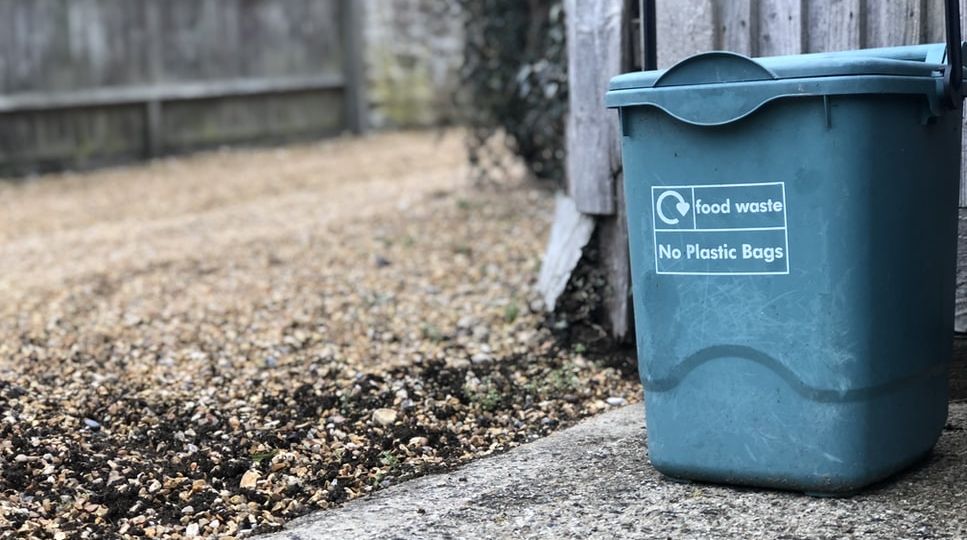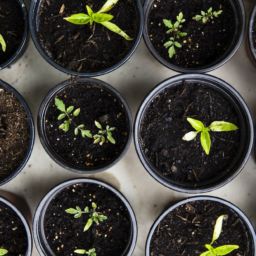
If you’ve been thinking about how to be more sustainable and eco-conscious, but aren’t sure where to start—try composting. While it can sound daunting and confusing, it’s actually not as complicated as you might think.
The United States Department of Agriculture found that 30-40% of the food supply in the U.S. is wasted. When you throw your food waste away, it does not break down, and it can stay in landfills for years releasing methane gas. However, if you choose to compost, the waste can be broken down into nutrient rich soil within a month.
Composting is the process of allowing organic waste to naturally decompose in order to create nutrient-rich soil. All organic waste will eventually decompose, but composting speeds up the process.
In order to compost, you need three things: brown materials like dead leaves and twigs, green materials like grass clippings or fruit and vegetable waste, and water.
Once you have these materials, you will need to decide which type of composting works best for you. The good news is you have plenty of options. You can compost in a pile, tumbler, a worm bin, bury it in the ground, or have a service take it away.
Pile Technique
If you decide to use the pile technique, you should start by creating a space on the ground. Use straw and twigs to help aerate the pile, and then, add your compost materials in layers. You will need to keep your compost moist by watering it occasionally, or you can put it in an area that will get rain. Next, cover the compost, so it will retain heat and moisture. You can use wood, sheets, or even carpet scraps for the covering.
Every couple of weeks, use a shovel or pitchfork to rearrange the pile. This will speed up the decomposition process. Once you have your compost pile going, you can add your compost materials by mixing them in.
This technique requires a yard. While it can work in a small yard, if you don’t want your compost pile to take up too much space, a larger yard works best.
Compost Tumbler
Another option is to invest in a compost tumbler. A compost tumbler is a sealed container that can be rotated, so you won’t need to use a shovel. This technique also speeds up the compost process. Compost tumblers are different than compost bins, which are typically open at the bottom and still need to be turned.
Compost tumblers can be used in an apartment if you have access to outdoor space, such as a balcony. However, it will need to be emptied once the compost has finished decomposing.
Worm Bins
If you don’t mind worms, you can try a worm bin, which does not require any turning or access to a yard. A worm bin can be created by drilling holes in a plastic bin with another placed underneath to catch any drainage. They can also be purchased already made.
Worm bins can be placed inside or outside, but if they are outside they will likely die in the cold Indiana winter. Inside, it will take greater management to make sure it does not smell, but this can be a great option for apartments and small spaces.
The red wiggler is the best type of worm for composting, and they are available at bait and fishing shops or online. It is important to make sure you do not add too many worms because this can cause the bin to smell.
Additionally, worms can eat almost any fruit of vegetables, but they should not eat animal products. You can also add coffee grounds, filters, napkins, shredded paper towels, and non-plastic teabags into the worm bin.
Castaway Compost is a local company that sells worms, worm compost, and worm bins that can help you get started with your first worm bin.
Bury Your Compost
For an easy low maintenance method, you can try burying your compost. This involves digging a trench and putting the compost materials inside. Then, simply cover the hole with soil and let nature do the rest.
This technique requires access to a yard and enough space to bury all of your compost materials. It also works best for a larger yard because if you continue to use this technique, you will likely be digging multiple holes.
Use a Service
Finally, if you don’t want to do any of the manual labor, you can use a service to pick up your compost. Green with Indy and Earth Mama Compost both offer services at varying prices to pick up your compost materials and compost them for you. This can also be a great option if you don’t have a lot of space or want less commitment.
Benefits of Composting
When your compost has finished decomposing, it should be dark brown, crumbly and smell like soil. That nutrient rich soil can be used in your yard, garden, or in the community to help fertilize plants. It is a simple and effective way that you can do your part to help the Earth.
Heather Maybury, the owner of Earth Mama Compost, recommends that first time composters start small, and use a service if they need help.
“I love it when those people that have been putting it off for years call me a few months in to tell me that we made it so easy that they are going to start composting at home!” she told us. “Going green has to be on your terms. If you feel like you can do more, then find something that you are passionate about and take another little step in the right direction.”
Ellie Allen is Indy Maven’s Editorial Intern who has never composted before but is excited to try these techniques.














